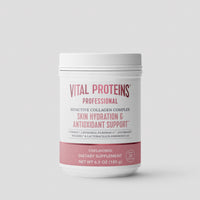It's the summer of wellness and we're all ready to refresh our daily routines. Our new Lively series will highlight all things hydration to help you live a fuller, more vibrant life with every sip.

You carefully plan your workouts and what you’re going to eat before and after you exercise. One aspect you might overlook — your hydration. It can be easy to get distracted by work or other responsibilities and that bottle on your desk you had intentions of refilling two or three times doesn't get emptied once. We get it. But everyone should consider the importance of hydration for their health. (And getting up to refill your water can help you reach your step goals, too!) Consider this your guide on the importance of hydration.
Vital Note: We also recommend discussing your health goals with your licensed healthcare professional. They can best provide you with the diagnosis and treatment of any medical condition and assist you as well in deciding whether a dietary supplement will be a helpful addition to your regimen.
How does hydration affect the body?
Hydration is extremely important for the human body. The body is made up of about 60 percent water, and every cell requires water to function.
"Dehydration can cause fatigue, impaired brain function, headaches, poor mood and so much more. For these reasons, good hydration is an essential pillar of health and wellness," Amy Davis, RD, LDN, tells Lively.

Why is hydration important for performance?
Hydration is important for everyone, but it is especially important for athletes.
Studies show athletic performance declines with just a 2 to 3 percent decrease in body weight from water lost through sweat, so being properly hydrated before, during and after every workout is essential for athletes.
"Declined performance from dehydration could include poor regulation of body temperature, increased fatigue, poor concentration and decreased motivation," Davis says.
How should an athlete hydrate for workouts?
While hydration needs vary from person to person, a general rule of thumb for estimation of daily water intake is to drink half your body weight in ounces of water daily. So for someone who weighs 150 lbs., they should drink 75 oz. (about nine cups) of water.
However, hydration requirements for athletes are higher, since they can lose up to 10 percent of their water weight through sweat, explains Davis.
The American Council on Exercise (ACE) suggests drinking 17 to 20 oz. of fluid about two to three hours before a workout, seven to 10 ounces for every 10 to 20 minutes during exercise, and post-workout replenishing with 16 to 24 oz. of fluid per pound lost. It’s also important to check in with your doctor before changing your diet for your performance.
Related Articles
What are the 5 benefits of drinking water?
Drinking water has many health benefits. Some benefits of drinking water include aiding in normal bowel function, a decreased risk of kidney stones, improved athletic performance,** and prevention of headaches, Davis says.
What are the benefits of drinking a lot of water?
"Drinking enough water is certainly beneficial and necessary to normal bodily function and metabolism. But drinking more than you need is not necessarily helpful," Davis says. There is no one-size-fits-all suggestion for how much water to drink in a day, and it varies depending on your health, activity levels and even where you live. The U.S. National Academies of Sciences, Engineering, and Medicine suggests about 15.5 cups of fluids a day for men and 11.5 cups of fluids a day for women — but keep in mind this recommendation includes fluids from food and other beverages plus water intake.
Note, it's important to not drink too much water, as this can cause hyponatremia, which means your kidneys can’t get rid of excess water and causes the sodium content of your blood to be diluted. Hyponatremia can be very dangerous, and even life-threatening.
What are the 4 main functions of water in the body?
Water is obviously an essential part of your diet, but it’s for more than just hydration, according to the Mayo Clinic — there are actually more than four main functions of water in the body. Drinking water can help regulate your body temperature, keep the tissues in your eyes, nose and mouth moist and carry oxygen to the cells.













